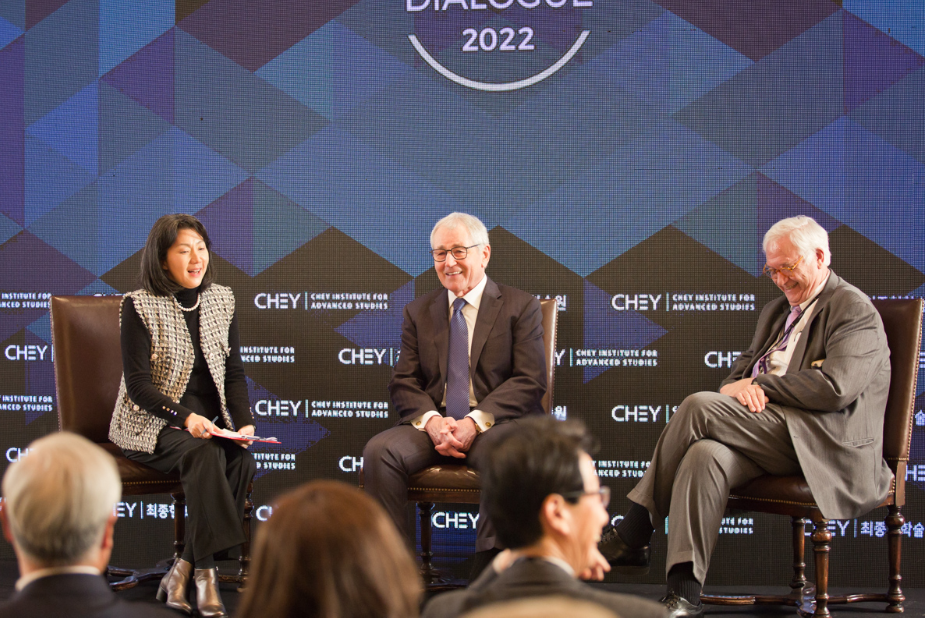2022.12.05 - 07
-
-

Trans-Pacific Dialogue 2022
#Northeast Asia
#International Order
#Korean Peninsula
#Korea-US Relations
#Geopolitical Risks
-

Trans-Pacific Dialogue 2022
#Northeast Asia
#International Order
#Korean Peninsula
#Korea-US Relations
#Geopolitical Risks
-

Trans-Pacific Dialogue 2022
#Northeast Asia
#International Order
#Korean Peninsula
#Korea-US Relations
#Geopolitical Risks
-

Trans-Pacific Dialogue 2022
#Northeast Asia
#International Order
#Korean Peninsula
#Korea-US Relations
#Geopolitical Risks
-

Trans-Pacific Dialogue 2022
#Northeast Asia
#International Order
#Korean Peninsula
#Korea-US Relations
#Geopolitical Risks
The Chey Institute for Advanced States hosted its second annual Trans-Pacific Dialogue, where distinguished experts and leaders came together to address crucial geopolitical security issues. Top government officials, opinion leaders, and scholars from Korea, Japan, and the United States participated in six thought-provoking sessions, fostering debate, discussion, and dialogue to identify solutions and explore future opportunities.
A special public session entitled "Future of ROK-Japan Cooperation on Major Global Affairs" was held to explore the recent improvement in relations between Korea and Japan. Ambassador Fujisaki Ichiro and Councillor Ms. Matsukawa Rui concurred that the Yoon Administration's commitment to improving bilateral relations had created a "golden opportunity" for both countries. Participants engaged in discussions on various areas of ROK-Japan bilateral cooperation, highlighting the importance of expanding people-to-people exchanges to foster interactions between the two nations, particularly among young leaders and professionals in various sectors.
Session 1, “US-China Strategic Competition,” delved into the impacts of two major events, the Russia-Ukraine War and the 20th National Party Congress of the Chinese Communist Party. The discussion highlighted the emergence of two distinct world orders: a liberal multilateral order led by liberal democracies, and a post-liberal order championed by China and its partners that emphasizes regional spheres of influence and safeguarding autocratic rule. One expert pointed out the delicate balance between Korea and Japan’s economic interests in trading with China and their security concerns.
In the second session, "The Future of US Global Strategy in the Wake of the Ukraine War," participants explored America's pivot to Asia. An American panelist asserted that, in order for the U.S. to focus on the East Asia region, it must transfer the responsibility for European security to Europe's hands. Panelists also assessed the impact of the War in Ukraine on Xi Jinping's calculus. It was noted that Russia's setbacks have prompted China to exercise caution regarding military actions. Conversely, arguments were made that China will likely avoid repeating Putin's mistakes.
During the third session titled "The North Korean Nuclear Crisis," the focus was on North Korea's rapid advancements in nuclear and missile capabilities, alongside the potential for trilateral cooperation between the United States, South Korea, and Japan. Panelists agreed that denuclearization on the Korean Peninsula must remain the ultimate policy objective for the U.S. and its allies, though they presented different approaches to achieve this goal. The topic of extended deterrence sparked intense discussions, as Korean and Japanese panelists expressed mounting concerns about the credibility of US extended deterrence.
In Session 4, “Scientific Innovation and its Geopolitical Impact,” panelists explored emerging cutting-edge technologies, particularly those with dual-use purposes. Technologies such as AI and quantum computing were of special concern due to their capacity to drastically shift power dynamics. With a technology race between China and the US underway, panelists sought ways to secure an edge. Panelists from all three countries outlined the steps needed for a successful US-ROK-Japan technological alliance.
During the concluding session, "Future of Global Supply Chains and Impact of Global Inflation," the role of supply chains in great power competition was examined, with a particular focus on semiconductors. Panelists weighed the downsides and benefits of the CHIPS Act. The concept of a Fab-4 alliance was also explored. The session culminated with discussions on the rising influence of Russia and China in the Global South, and the necessity for coordinated counter actions to address this challenge.
Robert D. ATKINSON, Thomas BYRNE, Kurt CAMPBELL, Victor CHA, Robert EINHORN, Edwin FEULNER, Robert GALLUCCI, Chuck HAGEL, John HAMRE, John IKENBERRY, Seth JONES, Bruce KLINGNER, John J. Mearsheimer, Evan MEDEIROS, Jon OSSOFF, Nirav PATEL, Daniel PONEMAN, Daniel RUSSEL, Rexon Ryu, Gary SAMORE, Sue Mi TERRY, Susan THORNTON, Stephen WALT, Joseph YUN, AKIYAMA Masahiro , FUJISAKI Ichiro , FUJIWARA Kiichi, FUKAGAWA Yukiko , KITAGAMI Keiro , NAKABAYASHI Mieko , SAKATA Yasuyo , SUGIYAMA Shinsuke , TOKUCHI Hideshi , AHN Ho Young, BARK Taeho, CHEY Tae-won, HONG Kyu-Dok, KANG Kisuk, KIM Byung-yeon, Jungsang KIM, KIM Yoon, LEE Chung Min, LEE Geunwook, LEE Jae-Seung, Lee Shinhwa, PARK Cheol-Hee, PARK In-Kook, SOHN Jie-ae, YOON Young-kwan, Jeong Joon Yu, Evelyn FARKAS, Anthony KIM, Dan KIM, Robert LEACHMAN, Lain Marlow, Mira RAPP-HOOPER, Andrew YEO, HIROSE Noashi, MATSUKAWA Rui, NISHINO Junya, OTA Yasuhiko, SAHASHI Ryo, TOMITA Koji, YAMAGUCHI Tsuyoshi, CHO Taeyong, CHUN Chaesung, Seok Joon Kwon, LEE Hawon